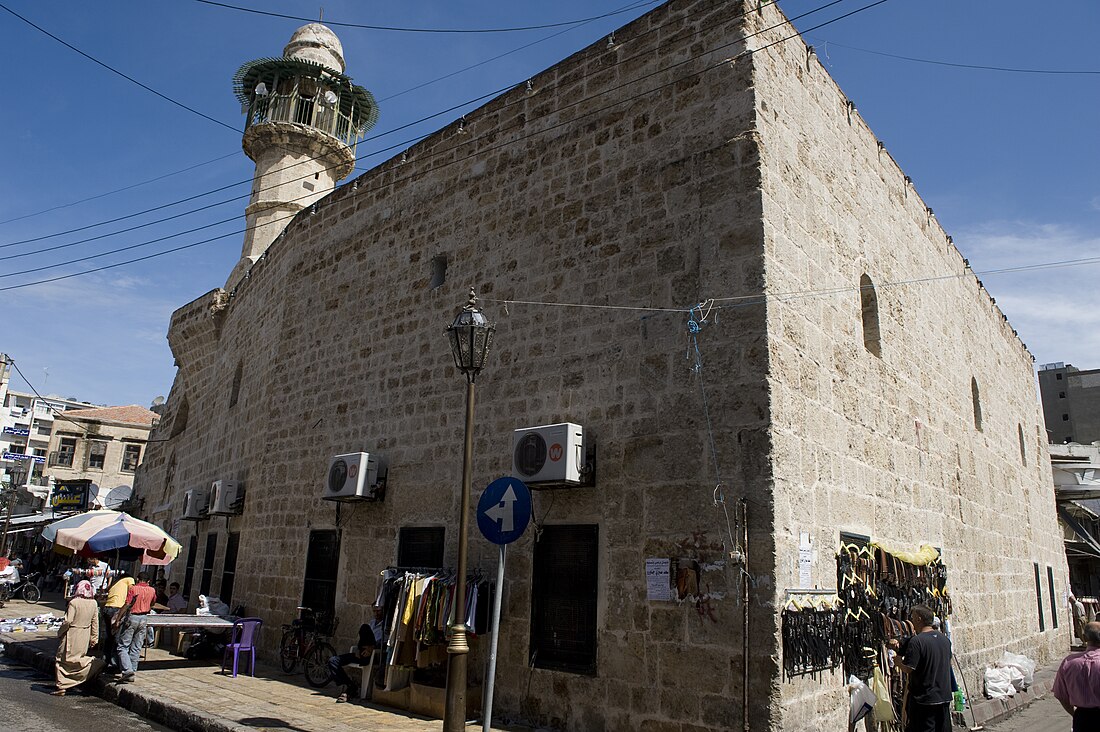Siege of Laodicea (636)
636 CE siege of Byzantine Syrian city by the Rashidun Caliphate From Wikipedia, the free encyclopedia
The siege of Laodicea was a Rashidun Caliphate campaign that occurred in 636, during the Muslim conquest of the Levant. The siege of the Byzantine port city of Laodicea (modern Latakia) was led by Abu Ubaydah ibn al-Jarrah and 'Ubadah ibn al-Samit, two of the Companions of the Islamic prophet Muhammad.
| Siege of Laodicea | |||||||||
|---|---|---|---|---|---|---|---|---|---|
| Part of the Muslim conquest of Syria (Arab–Byzantine wars) | |||||||||
 Jami' al-Bazaar mosque in Latakia built by 'Ubadah ibn al-Samit during conquest of Levant | |||||||||
| |||||||||
| Belligerents | |||||||||
| Byzantine Empire | Rashidun Caliphate | ||||||||
| Commanders and leaders | |||||||||
| Unknown |
Abu Ubaydah ibn al-Jarrah 'Ubadah ibn al-Samit Anas ibn Malik | ||||||||
Background
After the city of Tartus was subdued in 636, 'Ubadah ibn al-Samit was immediately instructed by his superior, Abu 'Ubaydah to march towards Jablah and Latakia, then known as Laodicea.[1][2]
Siege
During the siege, 'Ubadah met stiff resistance from the local garrison. He saw that the city had a massive gate that could only be opened by many men. 'Ubadah then ordered them to camp at a distance from the city. They dug a trench deep enough to conceal his cavalry. 'Ubadah and his army pretended to return to Homs during the hours of daylight, but later that night he and his army silently returned and hide themselves within the trench.[3]
Believing 'Ubadah and his men had gone, the citizens opened the city gate and drove forth their cattle. 'Ubadah immediately ordered his entire army to attack. The Byzantines, caught by surprise, were unable to close the gate again. 'Ubadah climbed upon the wall and shouted the takbir battle cry, whereupon his soldiers entered into the city. The terrified Byzantine defenders then fled towards Al-Yusaiyid, leaving the city undefended.[3]
Aftermath
The fleeing Byzantine soldiers and the local citizens surrendered to 'Ubadah, who allowed the population to return to their homes, on the condition that they paid the kharaj land tax.[3]
Latakia was left largely intact by 'Ubadah, who supervised the building of mosques in the city, and stayed to impose Caliphate laws upon the population. He built the great mosque, Jami' al-Bazaar. Laodicea, the Greco-Roman name of the city, was changed to Latakia (Al-Ladhiqiyah).[3][4]
References
Sources
Wikiwand in your browser!
Seamless Wikipedia browsing. On steroids.
Every time you click a link to Wikipedia, Wiktionary or Wikiquote in your browser's search results, it will show the modern Wikiwand interface.
Wikiwand extension is a five stars, simple, with minimum permission required to keep your browsing private, safe and transparent.
